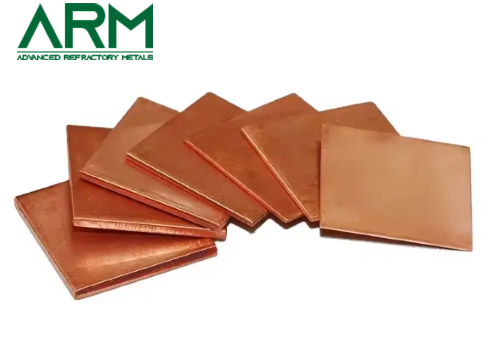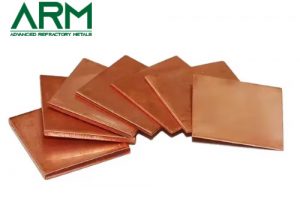All You Need to Know about Beryllium Copper Alloy

Introduction
Beryllium Copper, or BeCu, is a versatile copper alloy that combines 0.2-2.0% beryllium with copper and sometimes other elements. This unique composition imparts a balance of properties that make it indispensable across various industries.
Known for its high strength, excellent conductivity, and durability, beryllium copper is a material of choice in applications ranging from aerospace to electronics. This article explores the types, benefits, applications, and manufacturing processes of beryllium copper alloy.
Types of Beryllium Copper

When categorized based on beryllium content:
- The first type is high conductivity beryllium copper, which contains 0.2% to 0.6% beryllium. This type emphasizes high electrical and thermal conductivity, with C17500 being a typical alloy.
- The second type is high strength beryllium copper, which contains 1.6% to 2.0% beryllium. This type focuses on achieving high mechanical strength, and C17200 is a typical alloy in this category.
When categorized based on the manufacturing process:
- The first type is wrought beryllium copper, which is produced through deformation processes such as rolling, drawing, or forging. Common alloys in this category include C17000, C17200 (high strength), and C17500 (high conductivity).
- The second type is cast beryllium copper, which is produced through casting processes. Common cast alloys include C82000 and C82200, which emphasize high conductivity, as well as C82400, C82500, C82600, and C82800, which are designed for high strength and wear resistance.
Benefits of Beryllium Copper
- High Strength:
Beryllium copper alloys can be age-hardened to achieve tensile strengths up to 200 ksi (kilopounds per square inch). For instance, C17200 alloy can achieve tensile strengths in the range of 140-200 ksi after proper heat treatment. This high strength, combined with excellent fatigue resistance, makes BeCu suitable for applications involving cyclic loading and repeated stress.
- Excellent Conductivity:
Beryllium copper retains significant electrical and thermal conductivity, about 15-30% of pure copper's conductivity. C17500 alloy, for example, offers about 45-60% IACS (International Annealed Copper Standard) conductivity, making it ideal for high-performance electrical applications. This property ensures efficient transmission of electricity and heat in demanding environments.
- Non-Sparking and Non-Magnetic:
BeCu is non-sparking, making it safe for use in hazardous environments where sparks could ignite flammable gases or materials. This property is essential in industries such as mining and oil and gas, where safety is paramount. Additionally, beryllium copper is non-magnetic, vital for applications in magnetic-sensitive environments such as aerospace and defense.
- Corrosion Resistance:
Beryllium copper exhibits good corrosion resistance, particularly in marine and industrial environments. For example, C17200 alloy provides excellent resistance to saltwater corrosion, extending the life of components and reducing maintenance costs in harsh conditions.
- Machinability and Formability:
Beryllium copper alloys can be easily machined and formed, allowing for the manufacture of complex and precise components. The machinability of C17200, for instance, is rated at 20% of free-cutting brass, making it suitable for producing intricate parts with high dimensional accuracy.
Applications of Beryllium Copper
1. Electronics and Electrical Applications
Beryllium copper's high electrical conductivity and resilience make it ideal for electronic components such as:
- Connectors and Contacts: Ensures reliable electrical connections in computers, telecommunications, and consumer electronics.
- Springs and Relays: Withstands repeated cycles without losing elasticity, maintaining performance over time.
- EMI Shielding: Used in shielding components to protect sensitive electronic equipment from electromagnetic interference.
Related reading: The Role Of Copper Beryllium In High-Performance Electronics
2. Aerospace and Defense
The aerospace industry benefits from beryllium copper's high strength-to-weight ratio and fatigue resistance:
- Aircraft Components: Used in flight instruments, navigation systems, and structural components requiring durability under stress.
- Defense Applications: Provides corrosion-resistant materials for military-grade electronics and non-sparking tools.
3. Oil and Gas Industry
BeCu’s non-sparking and non-magnetic properties are vital for safety in explosive environments:
- Tools: Non-sparking hammers, screwdrivers, and wrenches ensure safety in flammable atmospheres.
- Downhole Equipment: Resistant to corrosion and fatigue, making it suitable for oil drilling and exploration tools.
4. Automotive Sector
Beryllium copper's wear resistance and thermal stability make it a preferred material in:
- Valve Seats and Guides: Enhances engine performance and longevity.
- Sensors and Switches: Used in ignition systems and anti-lock braking systems.
5. Industrial and Manufacturing Applications
Its exceptional thermal conductivity and machinability make it indispensable in manufacturing:
- Injection Molds: Reduces cycle times in plastic manufacturing due to rapid heat dissipation.
- Precision Machining: Ideal for intricate components requiring close tolerances.
6. Telecommunications
Beryllium copper is extensively used in connectors and contacts for high-frequency systems, where durability and signal integrity are critical.
Manufacturing of Beryllium Copper
Wrought beryllium copper alloys are produced through deformation processes such as rolling, drawing, and forging. These processes enhance the mechanical properties of the alloy, making it suitable for various applications. The most common wrought alloys include C17000, C17200, and C17500. These alloys are typically supplied in the form of rods, bars, strips, and wires.
Cast beryllium copper alloys are produced through casting processes, where the molten alloy is poured into molds to form specific shapes. Cast alloys like C82000 and C82200 emphasize high conductivity, while C82400, C82500, C82600, and C82800 focus on high strength and wear resistance. Cast beryllium copper is often used for complex and large components that require precise shapes and sizes.
Heat treatment is a critical step in the manufacturing process of beryllium copper. Age hardening, or precipitation hardening, involves heating the alloy to a specific temperature and then cooling it at a controlled rate. This process enhances the alloy's mechanical properties, such as strength and hardness. For instance, C17200 alloy is typically age-hardened to achieve its maximum tensile strength.
While beryllium copper offers numerous advantages, handling it with care is essential. Beryllium is a toxic element, and inhaling its dust or fumes can cause serious health issues, including chronic beryllium disease (CBD). Therefore, appropriate safety measures, such as proper ventilation and protective equipment, are necessary when machining or processing beryllium copper alloys.
Conclusion
Beryllium copper alloy stands out as a material that combines high strength with excellent conductivity, making it a critical component in various high-performance applications. Its unique properties of being non-sparking, non-magnetic, and corrosion-resistant further enhance its versatility and reliability.
As technology advances, the demand for materials that can meet stringent performance criteria will continue to grow, solidifying the importance of beryllium copper in modern engineering and manufacturing. For more information, please check Advanced Refractory Metals (ARM).
{{item.content}}
LEVE A REPLY
{{item.children[0].content}}
{{item.content}}






